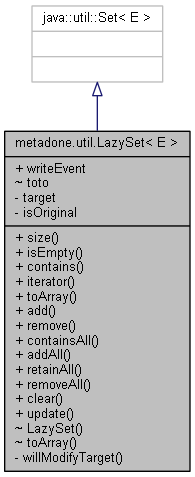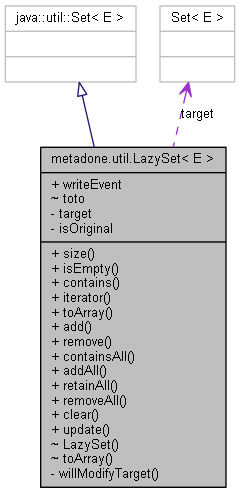|
MetaDone
|
|
MetaDone
|


Classes | |
| class | WriteEvent |
Public Member Functions | |
| int | size () |
| boolean | isEmpty () |
| boolean | contains (Object arg0) |
| Iterator< E > | iterator () |
| Object[] | toArray () |
| boolean | add (E arg0) |
| boolean | remove (Object arg0) |
| boolean | containsAll (Collection<?> arg0) |
| boolean | addAll (Collection<?extends E > arg0) |
| boolean | retainAll (Collection<?> arg0) |
| boolean | removeAll (Collection<?> arg0) |
| void | clear () |
| void | update (Observable subject, Object event) |
Static Public Attributes | |
| static WriteEvent | writeEvent = new WriteEvent() |
Package Functions | |
| LazySet (Set< E > target) | |
| public< T > T[] | toArray (T[] arg0) |
Package Attributes | |
| WriteEvent | toto |
Private Member Functions | |
| void | willModifyTarget () |
Private Attributes | |
| Set< E > | target |
| boolean | isOriginal |
Date=30-avr.-2006 - 22:19:42 Filename = LazySet.java
LazySets are smart proxy to Set structures. The proxy is just a reference to the original set as long as the target set is not modified. If any modification occurs, then the link between the proxy and the target is broken and the target set is copied inside the proxy.
The behaviour of the program is not necessary monotonic, indeed, since iterators can continue to reference the original set while the user continues to modify a new set, the program can diverge from its "normal/previous" behaviour (i.e. without LazySet).
| metadone.util.LazySet< E >.LazySet | ( | Set< E > | target | ) | [package] |
| boolean metadone.util.LazySet< E >.add | ( | E | arg0 | ) |
| boolean metadone.util.LazySet< E >.addAll | ( | Collection<?extends E > | arg0 | ) |
| void metadone.util.LazySet< E >.clear | ( | ) |
| boolean metadone.util.LazySet< E >.contains | ( | Object | arg0 | ) |
| boolean metadone.util.LazySet< E >.containsAll | ( | Collection<?> | arg0 | ) |
| boolean metadone.util.LazySet< E >.isEmpty | ( | ) |
| Iterator<E> metadone.util.LazySet< E >.iterator | ( | ) |
| boolean metadone.util.LazySet< E >.remove | ( | Object | arg0 | ) |
| boolean metadone.util.LazySet< E >.removeAll | ( | Collection<?> | arg0 | ) |
| boolean metadone.util.LazySet< E >.retainAll | ( | Collection<?> | arg0 | ) |
| int metadone.util.LazySet< E >.size | ( | ) |
| public<T> T [] metadone.util.LazySet< E >.toArray | ( | T[] | arg0 | ) | [package] |
| Object [] metadone.util.LazySet< E >.toArray | ( | ) |
| void metadone.util.LazySet< E >.update | ( | Observable | subject, |
| Object | event | ||
| ) |
| void metadone.util.LazySet< E >.willModifyTarget | ( | ) | [private] |
boolean metadone.util.LazySet< E >.isOriginal [private] |
Set<E> metadone.util.LazySet< E >.target [private] |
WriteEvent metadone.util.LazySet< E >.toto [package] |
WriteEvent metadone.util.LazySet< E >.writeEvent = new WriteEvent() [static] |